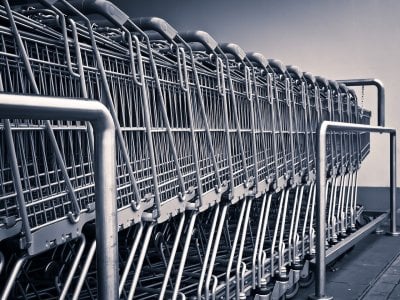ACCC urged to investigate Coles, Woolworths price discrepancies
It's been a tough few years for shoppers in Australia, especially those living on a budget and already struggling to get by.
The rising cost of living has made it tougher than ever to stretch a dollar, and it doesn't help when supermarkets have also bumped up their prices on a wide range of essential items.
That’s why one senior member of parliament has asked the Australian Competition and Consumer Commission (ACCC) to investigate why prices at two of the biggest local supermarkets, Coles and Woolworths, have been slow to change despite lower prices from farmers.
Shadow Agricultural Minister David Littleproud suggested taking note of recent figures from Meat and Livestock Australia, who have reported that some categories of sheep and lamb have fallen by up to 70 percent at the saleyards in the last year.
‘Lamb prices have drastically reduced and cattle prices have fallen by about 60 per cent. Yet families at the supermarkets have barely noticed a difference in prices,’ he said.
Data released in August revealed that the two grocery giants reported financial gains and their profits exceeded the $1 billion mark.
Woolworths Group, which owns the largest supermarket chain in Australia, reported a $1.62 billion profit in August. Meanwhile, Coles Group, the country's second-largest supermarket chain owner, announced an annual profit of $1.1 billion.
While Labor has initiated a competition task force to scrutinise the industry, this process reportedly is expected to progress over two years. Littleproud stressed the urgency, stating that an ‘urgent response’ is essential.
Littleproud pressed for an investigation, asserting that ‘families cannot afford to wait two years for answers’.
In contrast to a lengthy review, Littleproud argued that the Australian Competition and Consumer Commission (ACCC) has more authority to take immediate action and lower prices.
The ACCC responded to Littleproud by reminding the public that the attempt to regulate pricing in the agriculture sector in the past ended in disaster.
‘Grocery prices have been impacted by various factors, including supply chain disruptions, increasing prices of fuel and energy, high transport costs, labour shortages, poor weather conditions and significant weather events, and high international demand for some products placing additional pressure on domestic prices,’ a spokesperson said.
They mentioned that, although they have conducted market studies, the ACCC also lacks the authority to regulate pricing in the agriculture sector.
‘Past attempts to impose regulated pricing in agriculture, such as the Wool Reserve Price Scheme, eventually had a disastrous direct impact on farmers, and also stifled innovation and productivity, reducing the global competitiveness of the sector.’
'Australia’s recent success as a major agricultural exporter is very much dependent on the competitiveness of the sector, which would inevitably be put at risk if prices were to be regulated,' they warned.
Nevertheless, the ACCC has issued recommendations advocating for changes to government policy.
‘The ACCC has, in a number of inquiries and market studies, made recommendations about the need for more price transparency in agricultural supply chains from downstream participants such as food processors,’ the spokesperson added.
‘This is particularly important in concentrated markets.’
Ultimately, they stressed that the decision on whether a price inquiry proceeds is a matter for the government to determine.

Members, what do you think of this story? Share your thoughts in the comments below!
The rising cost of living has made it tougher than ever to stretch a dollar, and it doesn't help when supermarkets have also bumped up their prices on a wide range of essential items.
That’s why one senior member of parliament has asked the Australian Competition and Consumer Commission (ACCC) to investigate why prices at two of the biggest local supermarkets, Coles and Woolworths, have been slow to change despite lower prices from farmers.
Shadow Agricultural Minister David Littleproud suggested taking note of recent figures from Meat and Livestock Australia, who have reported that some categories of sheep and lamb have fallen by up to 70 percent at the saleyards in the last year.
‘Lamb prices have drastically reduced and cattle prices have fallen by about 60 per cent. Yet families at the supermarkets have barely noticed a difference in prices,’ he said.
Data released in August revealed that the two grocery giants reported financial gains and their profits exceeded the $1 billion mark.
Woolworths Group, which owns the largest supermarket chain in Australia, reported a $1.62 billion profit in August. Meanwhile, Coles Group, the country's second-largest supermarket chain owner, announced an annual profit of $1.1 billion.
While Labor has initiated a competition task force to scrutinise the industry, this process reportedly is expected to progress over two years. Littleproud stressed the urgency, stating that an ‘urgent response’ is essential.
Littleproud pressed for an investigation, asserting that ‘families cannot afford to wait two years for answers’.
In contrast to a lengthy review, Littleproud argued that the Australian Competition and Consumer Commission (ACCC) has more authority to take immediate action and lower prices.
The ACCC responded to Littleproud by reminding the public that the attempt to regulate pricing in the agriculture sector in the past ended in disaster.
‘Grocery prices have been impacted by various factors, including supply chain disruptions, increasing prices of fuel and energy, high transport costs, labour shortages, poor weather conditions and significant weather events, and high international demand for some products placing additional pressure on domestic prices,’ a spokesperson said.
They mentioned that, although they have conducted market studies, the ACCC also lacks the authority to regulate pricing in the agriculture sector.
‘Past attempts to impose regulated pricing in agriculture, such as the Wool Reserve Price Scheme, eventually had a disastrous direct impact on farmers, and also stifled innovation and productivity, reducing the global competitiveness of the sector.’
'Australia’s recent success as a major agricultural exporter is very much dependent on the competitiveness of the sector, which would inevitably be put at risk if prices were to be regulated,' they warned.
Nevertheless, the ACCC has issued recommendations advocating for changes to government policy.
‘The ACCC has, in a number of inquiries and market studies, made recommendations about the need for more price transparency in agricultural supply chains from downstream participants such as food processors,’ the spokesperson added.
‘This is particularly important in concentrated markets.’
Ultimately, they stressed that the decision on whether a price inquiry proceeds is a matter for the government to determine.
Key Takeaways
- Shadow Agricultural Minister David Littleproud has called for an ACCC investigation into supermarket prices due to a significant discrepancy in the cost of stock being sold by farmers.
- He pointed out that farmers are being paid significantly less for their products, but the reduced prices are not being reflected in supermarkets, which continue to charge the same prices.
- The ACCC responded, explaining that various factors have impacted grocery prices and that they do not have the power to regulate pricing in the agriculture sector.
- The ACCC mentioned that it has recommended the need for more price transparency in agricultural supply chains and that the decision to proceed with a price inquiry is up to the government.
Last edited by a moderator:








